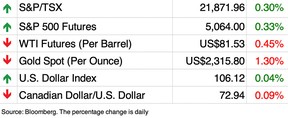Article content

The wealth gap has widened in Canada, as inflation, higher interest rates and lower property prices put the squeeze on middle-income families, a key engine of the economy.


Key engine of economy losing steam as wealth gap widens to biggest since 2015, says TD

The wealth gap has widened in Canada, as inflation, higher interest rates and lower property prices put the squeeze on middle-income families, a key engine of the economy.
Article content
A new study by TD Economics says Statistics Canada’s latest data on distributions of household economics accounts show the income gap has not been this wide since 2015.
“This distribution matters for Canada’s bottom line,” said Toronto Dominion economist Maria Solovieva.
Advertisement 2
Article content
National household net worth rose last year by 4.5 per cent to $16.4 trillion, rebounding from a decline of almost 6.5 per cent in 2022, but these gains were not shared across all income groups, says the report.
While income in the wealthiest households increased 6 per cent from the year before, income in the bottom and second quintiles barely rose or declined.
The wealth of all families rose in 2023, but higher-income households benefited the most because they held more financial assets, the big driver of gains last year.
Real estate, on the other hand — a substantial portion of wealth for the lower income groups, lost value, and mortgage debts increased.
Middle-income earners also became more indebted as earnings failed to keep up with inflation, racking up the largest increase in their debt-to-income ratio of any of the groups.
So what does this mean to the economy?
“The importance of these families in the economy cannot be overestimated,” said Solovieva.
Spending by middle-income households was the biggest contributor to consumption gains coming out of the pandemic.
Article content
Advertisement 3
Article content

“Key drivers of the pandemic economy, these families now face financial constraints that necessitate more conservative spending habits,” she said.
As they tighten their purse strings, overall consumer spending will likely slow.
What will keep the economy going for now is spending by the higher earners, said Solovieva.
They already account for more than half of consumer spending and may still have an appetite for discretionary items and the money to buy them.
“The top 40 per cent of the highest income earners … will become a critical swing factor in determining the degree of economic resilience,” she said.
Sign up here to get Posthaste delivered straight to your inbox.

Canada’s housing supply deficit sunk to new depths in the first quarter of 2024. The country’s working age population grew by a record 300,000 during the quarter, but housing starts stayed essentially flat at 61,000 units, said National Bank of Canada economist Stéfane Marion, who brings us today’s chart.
That leaves only one housing start for every 4.9 people entering the working-age population, compared to the historical ratio of 1.8.
Advertisement 4
Article content
“There is no precedent for a housing supply deficit of this magnitude, hence Ottawa’s obsession with trying to solve the imbalance,” said Marion.
“Unfortunately, it could take years to get things back to normal. In the meantime, Canadian households should not expect any significant relief from housing cost inflation.”

Advertisement 5
Article content
Capital gains tax hike got a lot of attention during the federal budget, and that change won’t even affect the majority of Canadians. Financial planner and columnist Ted Rechtshaffen has some strategies and tax-efficient products that can help a much larger percentage of Canadians save tax every year. Find out more at FP Investing.
Recommended from Editorial
Are you worried about having enough for retirement? Do you need to adjust your portfolio? Are you wondering how to make ends meet? Drop us a line at aholloway@postmedia.com with your contact info and the general gist of your problem and we’ll try to find some experts to help you out while writing a Family Finance story about it (we’ll keep your name out of it, of course). If you have a simpler question, the crack team at FP Answers led by Julie Cazzin or one of our columnists can give it a shot.
Want to learn more about mortgages? Mortgage strategist Robert McLister’s Financial Post column can help navigate the complex sector, from the latest trends to financing opportunities you won’t want to miss. Read them here
Today’s Posthaste was written by Pamela Heaven with additional reporting from Financial Post staff, The Canadian Press and Bloomberg.
Have a story idea, pitch, embargoed report, or a suggestion for this newsletter? Email us at posthaste@postmedia.com.
Bookmark our website and support our journalism: Don’t miss the business news you need to know — add financialpost.com to your bookmarks and sign up for our newsletters here.
Article content